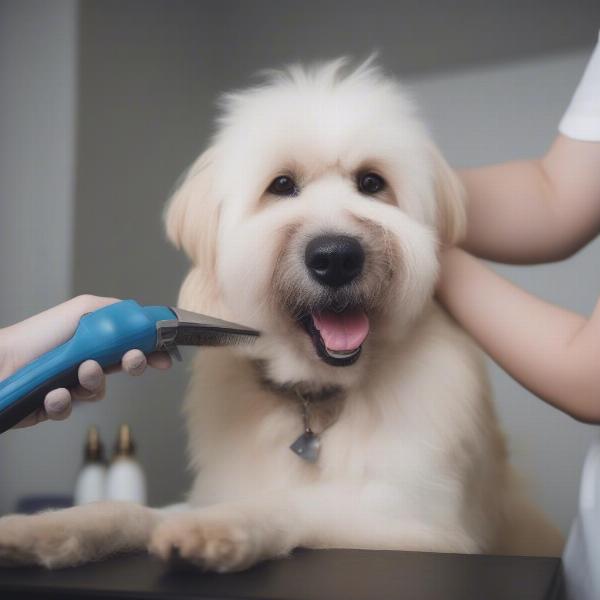A dog obsessively chasing and biting its tail can be a concerning sight for any owner. While occasional tail-chasing can be a playful behavior, frequent or aggressive biting can signal an underlying issue. Understanding why your dog keeps biting its tail is crucial for addressing the problem and ensuring their well-being. This article will delve into the common causes, offer practical solutions, and guide you on when to seek professional veterinary help.
Why is My Dog Obsessively Biting its Tail?
Several factors can contribute to a dog’s tail-biting habit. Identifying the root cause is the first step towards effective treatment. Is it a medical issue, a behavioral problem, or simply a quirky habit? Let’s explore the possibilities:
Medical Reasons for Tail Biting
- Allergies: Flea allergies, food allergies, and environmental allergies can cause intense itching and irritation, leading dogs to target their tails.
- Parasites: Fleas, ticks, and mites can infest a dog’s tail area, making them bite and chew to relieve the discomfort.
- Anal Gland Issues: Impacted or infected anal glands can cause discomfort and itching around the tail base, prompting biting.
- Hot Spots: These inflamed, moist lesions can be extremely itchy and painful, often leading to excessive licking and biting.
- Injuries: A tail injury, such as a fracture, sprain, or wound, can trigger biting as the dog tries to soothe the pain.
Behavioral Reasons for Tail Biting
- Boredom and Anxiety: Dogs with pent-up energy or anxiety may resort to tail-chasing and biting as a coping mechanism.
- Compulsive Disorder: In some cases, tail-biting can develop into a compulsive disorder, similar to obsessive-compulsive disorder (OCD) in humans.
- Attention-Seeking Behavior: If a dog has learned that tail-biting gets them attention, even negative attention, they may continue the behavior.
How to Stop a Dog from Biting its Tail
The best approach to stopping tail-biting depends on the underlying cause. Here are some strategies to consider:
Addressing Medical Issues
- Veterinary Check-up: The first step is to rule out any underlying medical conditions. A vet can diagnose allergies, parasites, anal gland problems, hot spots, or injuries and recommend appropriate treatment.
- Medication: Depending on the diagnosis, your vet may prescribe medication such as antihistamines, antibiotics, or pain relievers.
- Topical Treatments: For localized skin issues, topical creams, sprays, or shampoos may be recommended.
Addressing Behavioral Issues
- Environmental Enrichment: Providing a stimulating environment with plenty of toys, puzzles, and opportunities for exercise can help alleviate boredom and anxiety.
- Exercise: Regular physical activity is essential for burning off excess energy and reducing stress.
- muzzle for staffy dogs
- Training and Behavior Modification: Working with a certified dog trainer or behaviorist can help address underlying anxiety or compulsive behaviors.
- Increase Social Interaction: Providing more opportunities for social interaction with other dogs or people can help reduce anxiety and boredom.
When to Worry About Tail Biting
While occasional tail-chasing is usually harmless, persistent or aggressive tail-biting should be taken seriously. Seek immediate veterinary attention if:
- The tail is bleeding or injured.
- The dog seems distressed or in pain.
- The tail-biting is interfering with normal activities like eating and sleeping.
- The behavior has suddenly increased in frequency or intensity.
Preventing Tail Biting in Dogs
Prevention is always better than cure. Here are some proactive steps you can take:
- Regular Grooming: Regular brushing can help prevent matting and detect any skin issues early on.
- Parasite Prevention: Use flea and tick preventatives year-round to avoid infestations.
- Healthy Diet: A balanced and nutritious diet can support healthy skin and coat, reducing the risk of allergies and irritations.
- dog shield
- Mental Stimulation: Provide plenty of mental enrichment through training, puzzles, and interactive play.
 Dog getting groomed for tail biting prevention
Dog getting groomed for tail biting prevention
Conclusion
Tail biting in dogs can be a complex issue with various underlying causes. By understanding the potential medical and behavioral factors, you can take appropriate steps to address the problem and ensure your dog’s well-being. Don’t hesitate to seek professional veterinary advice if you are concerned about your dog’s tail-biting behavior. Early intervention is key to preventing the behavior from becoming a chronic issue. Remember, a happy tail wags, it doesn’t bite!
FAQ
- Is tail biting always a sign of a serious problem? No, occasional tail chasing can be normal play behavior. However, frequent or aggressive biting can indicate an underlying issue.
- Can I treat my dog’s tail biting myself? It’s crucial to consult a veterinarian to determine the cause of tail biting before attempting any treatment.
- How can I prevent my dog from developing a tail-biting habit? Providing a stimulating environment, regular exercise, and preventative veterinary care can help reduce the risk.
- What if my dog’s tail biting is caused by anxiety? Working with a certified dog trainer or behaviorist can help address underlying anxiety and compulsive behaviors.
- Is there a specific breed of dog more prone to tail biting? While any breed can develop tail biting, some breeds may be predisposed due to genetic factors or specific health conditions.
- How long does it take to stop a dog from biting its tail? The treatment timeline depends on the underlying cause and the individual dog. It may take weeks or even months to see significant improvement.
- What are the potential complications of untreated tail biting? Untreated tail biting can lead to self-inflicted injuries, infections, and chronic pain.
ILM Dog is your trusted resource for comprehensive information on dog care, health, and wellbeing. We offer expert advice on everything from breed selection and nutrition to training and behavior modification. Our mission is to empower dog owners with the knowledge and resources they need to provide the best possible care for their canine companions. Contact us at [email protected] or +44 20-3965-8624 for further assistance. Visit ILM Dog for more insightful articles and valuable resources.